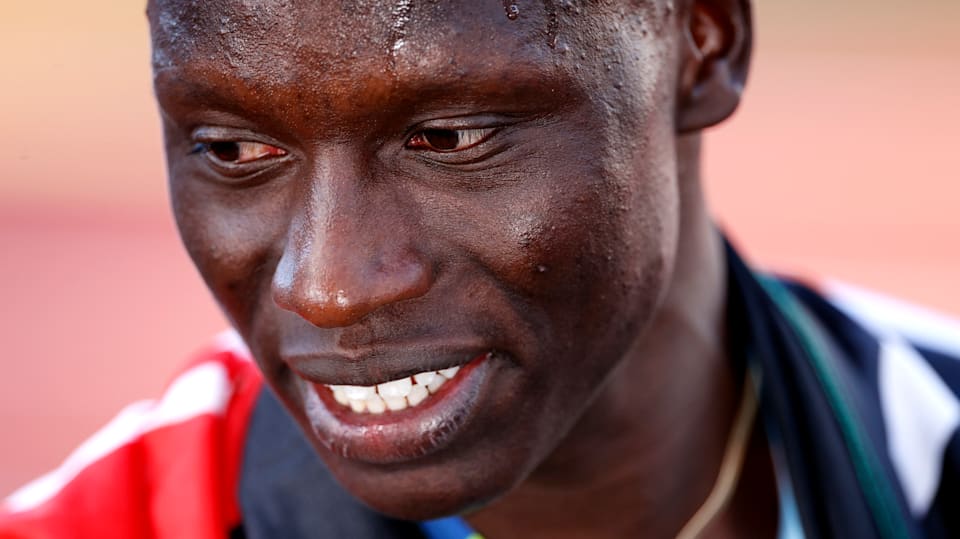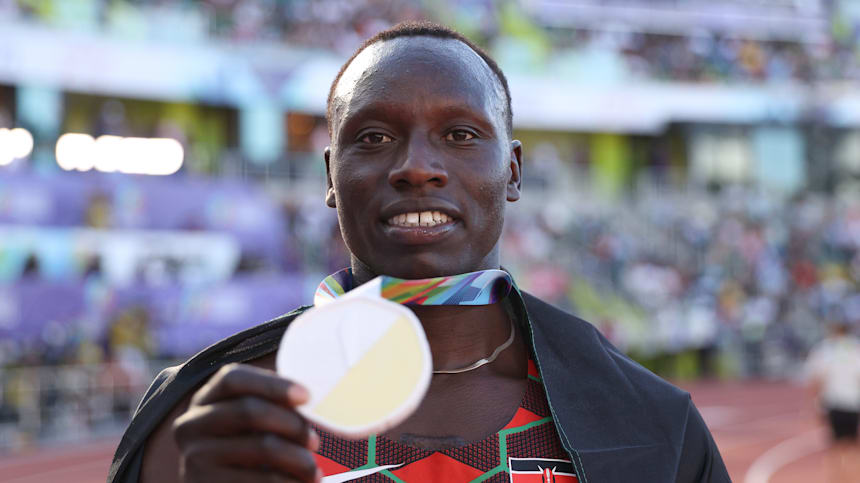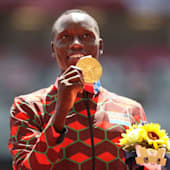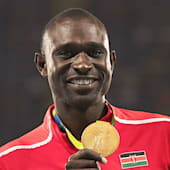Emmanuel Korir on nearly quitting track, losing crucial support and his comeback at the worlds
The Kenyan Olympic and world 800m champion spoke to Olympics.com on his 2022 struggles, and how his gold from Oregon has powered him up for the 2023 World Championships in Budapest as well as his second Games at Paris 2024.

Emmanuel Korir stood at the start of the 800m race, consumed by his thoughts.
The Kenyan struggled to keep the negative feelings from taking control.
It was the final of the World Championships in Oregon, another great moment of his athletics career.
It wasn’t his first major championship final, but this one felt different. The Olympic champion was coming from a very dark place.
“A lot of stuff was spinning in my head. It was really tough,” Korir recalled.
“It was like a trial in my life…people were expecting me to do something great after the Olympics. Something to prove that I am the only Olympic champion.”
Korir wrote his name in the history books, storming to victory in Tokyo, the fourth Kenyan man to win the 800m title at the Games.
Korir on the injury: "The fighting was real"
Instead, after his dream debut at the Olympics, he lost his form.
He had to deal with a calf injury, ran most of the season unsponsored, found himself isolated, and depressed.
“The injury… and, then, the people I expected to encourage and support me were celebrating (my misfortunes),” he revealed in an interview with Olympics.com.
After such a turbulent start to the season, it was hard to stand on the track in Oregon and be tension free.
In the July finals, the Kenyan managed to run a modest first lap. With about 500m to go, he found himself chasing the leaders as he had done for most of the season.
He regained his composure and went past the leader Marco Arop, showing the world what they had seen of Korir last season.
“The fighting was real,” he recalled. “The fighting spirit...expecting something at the end, even though I didn’t know what might happen.”
Now, he wants to create more athletics history in 2023 and beyond: becoming only the fourth man to win two gold medals at the World Championships.

Korir’s transition from sprinter to 800m star
Korir’s first introduction to sports was on the football pitch. He loved playing on the dirt pitches with his mates. But growing up in Iten, the Kenyan town known for producing world-class runners, he was naturally pushed to the track.
His obsession with running peaked in 2011 when he began sprinting the 100m.
Korir’s sprinting carried over to St. Francis Kimuron, the same high school David Rudisha attended. He hit the ground in the 200m and the relays.
He put all his energy into sprint work, but his greatest desire was training with renowned athletics coach Brother Colm O’Connell who was also based in Iten.
But there was a twist. The Irish-born coach, one of the most successful coaches in athletics who has been producing champions for over 40 years, was only working with middle- and long-distance runners.
O’Connell who was by then working with a group that included his most successful athlete, the two-time Olympic champion and world record holder over 800m Rudisha, convinced Korir to switch to the 400m.
“That was in 2013 when Willy Tarbei and I were young athletes, and that’s when I also met Rudisha and joined them for training during school holidays. The 400m was really long for me, I was mostly last or second last, but I never gave up,” he said.
“One-day Rudisha told me if I tried to do something to reduce my weight as I was huge then, I could make a good 800m runner.”
But the shift from the longer sprint to the 800m took time. It took Paul Ereng, Kenya’s first 800m Olympic champion from Seoul 1988, to fully switch to the two-lap race.
The prospect of a scholarship at the University of Texas in El Paso, where Ereng heads the track and field team, convinced him further that the move was right.
A 1:46.94 run in the finals of the 2016 Kenyan Championships earned him his ticket to the U.S.
“When I started running, it was hard for me. I remember in training sometimes I had to do 300s, 500s and 600s, and in the end, I only did one 500m. It was tough! But I never gave up.”
Olympic champion on the ups and downs of his 2022 season
“Tough” is also how Korir describes the first half of 2022.
An injury that he picked up in training in February forced him to skip the indoors.
The back-to-back Diamond League winner only managed to line up for his first race in May at a meeting in Florida, where he finished third in the 400m.
He ran his first 800m in June and could only manage a sixth-place finish in Montreuil. The Diamond League circuit was a struggle as well, as he came in eighth in Rabat and fifth in Stockholm.
The 2017 NCAA indoor and outdoor champion, opted to race the 400m at the Kenya Trials for the worlds as he had the wild card for the 800m.
Korir, who was no stranger to hectic seasons, needed to conserve his energy.
In 2017 and 2019, he failed to make the 800m finals at the World Championships. Following his personal best of 1:42.05 at London’s Olympic stadium at the 2018 Muller Anniversary Games, he struggled with back problems and injuries he sustained in a car accident just before Doha.
The 28-year-old managed to stay healthy in 2021 sealing his ticket to the Tokyo Olympics.
Korir felt he was on the brink of a breakthrough when he made the 800m finals, but the gold medal was 'way beyond' his reach, he thought.
“In the semis, I scrambled to the line, and I was lucky to make it to the finals. After that race, I remember my roommate Fergusson Rotich telling me, ‘This title is yours, you will win this!’ He was pretty confident, I was not.”
The surprise Olympic champion found himself struggling to deal with the pressure of expectations.
“Many thought maybe I never wanted to run,” he reflected.
“The people I expected to encourage and support me were celebrating saying, ‘We told you he is not going to make it. It’s time for him to quit this game, he's now getting old.
“A lot of stuff was spinning in my head. But I told myself, 'Focus. It’s only I who will determine the direction of where to go.'"
“I believed in myself and said I am still Emmanuel. God helped me, I am the Olympic champion and now a world champion…. a lot of stuff is still going to happen.”
2022 a lesson in patience for the world champion
His second consecutive global title boosted his confidence. The 2018 African champion, who holds the second fastest time ever on Kenyan soil of 44.21 that’s just 0.03 seconds off the long-standing 400m national record of Samson Kitur from Barcelona 1992, is already plotting how he can extend his championships streak.
“This year taught me a lot about patience. I tried using my previous tactics and it failed. But there was a race in France, I came from behind speeding through the last 150m and won. I thought to try the same at the worlds, it worked in the heats, semis and finals. I was patient and it worked.”
“If I made it to win the world championships then why not next year? It’s going to be tough, but I believe I can make it with the right training and good health.” - Emmanuel Korir on defending his world title in 2023 in Budapest.
Now settled at Puma, Korir is relieved and glad that the difficult season is behind him. He is eager to get back to running some fast times.
Any comparison to Rudisha, a double world champion, is flattering, but he’s clear that the analogy should not be stretched further.
“I don’t train for 400m, it’s a short distance for me. I may not even warm up for it. But I train hard for 800. Many people tell me I have the speed to break the world record, but I also need endurance.
“Just running 1:41 takes a lot. When people talk about the comparison of Emmanuel and Rudisha we are two different people.
“Again, the last two years, it’s been hard to run 1:42 for us the 800m guys, maybe because of the close championships so we had no time to think of the world record.”
Indeed, American Donavan Brazier’s gold medal-winning time of 1:42.34 at the 2019 World Championships remains the fastest in three years.
“The world record is not easy; it needs a plan...the 800m is one of the hardest events,” acknowledged the sixth fastest man of all-time, adding there is still a lot of work for him to do to get near Rudisha’s 1:40.91 mark that has remained unbeaten for a decade.
Unrivalled Rudisha sets 800m world record | London 2012 Replays
“I think next year, I would like to get to 1:41 if I can maintain the shape we can push to the world record, it can be achieved, nothing is impossible. It just needs a proper plan.
“We have great athletes like Krop...but next year we will have the World Championships and then Olympics is just round the corner."
But it’s not just about running fast, he’s also keen to help and prevent others going through what he did this season.
“I’m telling those who are struggling, never give up. Keep working hard, keep the passion, and stay focussed.
“We have many good athletes struggling and they don’t have the right support. There are those in Kenya who are surviving with one meal a day. Some reach out to me but I can’t really help everyone. In future I want to be one of those who can support or mentor athletes.”
Before then, Korir remains focussed on fitness to be battle-ready for whatever comes his way.
“A lot of stuff is still going to happen. I want to follow the footsteps of Eliud Kipchoge. He's really inspiring us, that no matter the age, you can do it. There is nothing like you are coming from this area, you don’t deserve this, or you are not like so and so.”








